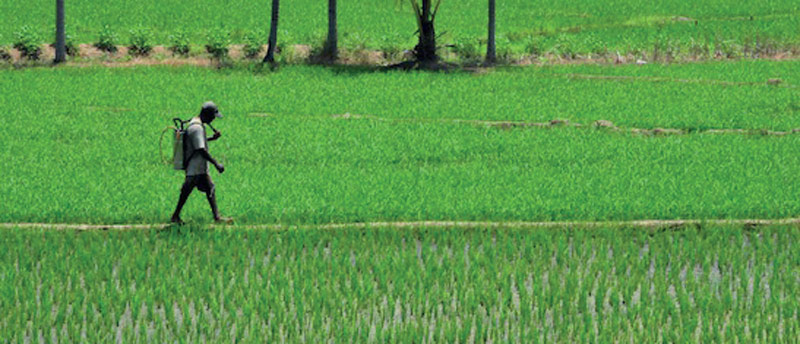Thursday Feb 19, 2026
Thursday Feb 19, 2026
Wednesday, 2 June 2021 02:04 - - {{hitsCtrl.values.hits}}

By Charumini de Silva
|
Cabinet Spokesman Keheliya Rambukwella
|
Following up on moves for a green agriculture policy, the Government yesterday announced firm plans to import non-hazardous fertiliser for 1.1 million hectares of paddy cultivation for the upcoming Maha season, as well as non-food non-soil farming.
Despite scepticism and reservations from some agriculturalists and experts, the Government yesterday insisted that its zeal towards organic farming was urgent to avoid the ill-effects of chemical fertilisers.
In this regard the Cabinet this week, on the recommendation of the Agriculture Minister, approved the appointment of a special procurement committee on organic fertiliser, natural minerals and chelated herbal trace, and a technical committee specialised for the relevant subject to assist the procurement committee.
The Cabinet also decided to import required carbonic fertiliser and natural minerals through the Government-owned fertiliser company for 500,000 hectares of paddy cultivation for the 2021/2022 Maha season, with accordance to the international competitive bidding method, and distributing them through the Department of Agrarian Services.
Separately, a proposal was put forward to import carbonic fertiliser, through licensed companies that have permission to import fertiliser, for 600,000 hectares of the other crops, adhering to the recommendations of the research institutions of the relevant crops.
Another move is to import specific fertiliser for non-food charming plants and cut flower cultivations and non-soil cultivation through the Import License Method, adhering to the recommendations of the research institutes of the relevant crops. Separately, the Cabinet also approved the formalisation of its 27 April decision to ban import of chemical fertiliser, pesticide and weedicide.
Multiple moves came hot on the heels of President Gotabaya Rajapaksa last week, during a special discussion with the officials from the Agriculture Ministry and organic fertiliser manufacturers at the Presidential Secretariat, calling for necessary steps to be taken to provide organic fertiliser for the Maha Season to farmers without any shortage.
This week’s Cabinet decisions are in line with the Government’s decision to ban the use and import of chemical fertilisers, pesticides and herbicides, to promote the use of organic fertilisers in the country.
In April, President Rajapaksa, revealing the move, said he will take up the challenge of making Sri Lanka the first country in the world to end use of chemical fertilisers completely.
“The fact that no country in the world has abandoned the use of chemical fertilisers is not an obstacle to achieving this goal,” the President said, urging everyone to get together to educate farmers.
“Although the transformation from chemical fertilisers to organic fertiliser is considered a highly unpopular policy decision, it is important to note that President Gotabaya Rajapaksa took this decision after considering the long-term benefit to the country and its people,” Cabinet Spokesman and Mass Media Minister Keheliya Rambukwella told journalists at the weekly Cabinet media briefing yesterday.
The Government said at present there are 27 local organic fertiliser manufacturers licensed by the National Fertiliser Secretariat Office and, considering the production capacity of 10 of them, it is possible to supply carbonic fertiliser locally for 224,000 hectares for the 2021/2022 Maha season and to manufacture the required carbonic fertiliser for another 100,000 hectares subsequently, to make available of the required facilities for the identified farmers.
According to the Central Bank, in 2020 the country spent $ 259 million on fertiliser imports, up 17% from $ 221.4 million in 2019.
President Rajapaksa has said that the decision to start using organic fertiliser was taken towards endowing a healthy future generation in the country. He said the ‘Vistas of Prosperity and Splendour’ policy framework stated that the whole agricultural sector of the country should be transformed to use organic fertilisers entirely.
“It is the responsibility of the Government to act in accordance with the pledges made to the people. Previous Governments have tried to popularise the use of organic fertilisers but have not been able to sustain the practice. This is a challenging task; a difficult one, but it should be done on behalf of the country after identifying the correct strategy,” Rajapaksa told the meeting with the newly appointed members of the ‘Presidential Task Force on Creating a Green Sri Lanka with Sustainable Solutions to Climate Change’.
The President’s Special Representative Basil Rajapaksa is the Chair of the task force, comprising 46 members, including five Cabinet Ministers, a Governor, 14 State Ministers and a female Member of Parliament.
The President also said that the Government is ready to buy paddy for a higher price than the guaranteed price if there is any reduction in the yield due to the use of organic fertiliser. Therefore, he said the farmers should not have any fear in the initiative. Farmers may assume that giving up on chemical fertilisers will reduce the yield. If it does, the President guarantees that the Rs. 50 billion spent annually on chemical fertilisers will be used to recover their loss.
The President also said that the Government is ready to bear the cost to ensure consumers can purchase rice at existing prices. The President further stated that the Government is ready to provide the necessary facilities if the companies that imported chemical fertilisers start producing organic fertiliser.
The Government has so far taken steps to increase the production of organic fertiliser to meet 30% of the farmer requirements.
